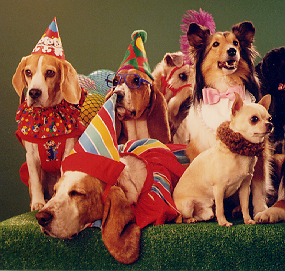Which Type of Dog?

There are many considerations when choosing a puppy, including which breed or type, and the optimal age of acquisition. Obviously, you want to choose a dog that is best suited to you and your lifestyle. Rather than listing my preferences, I will discuss some of the more important guidelines.
First, please do not kid yourself that all you have to do is select the "perfect" breed and the "perfect" individual puppy and he will automatically grow up into the "perfect" adult dog. Any puppy can become a marvelous companion if appropriately socialized and trained. And, no matter what his breed or breeding, any puppy can become a doggy delinquent if not properly socialized and trained. Please make an intelligent, researched choice when selecting your puppy, but remember: appropriate socialization and training is the single biggest factor determining how closely the dog will approach your view of perfection in adulthood.
Second, seek advice from the best sources. Common mistakes are to take breed advice from veterinarians, health advice from breeders, and all-important behavior and training advice from veterinarians, breeders, and pet-store personnel. The best plan is to seek training and behavior advice from trainers and behavior counselors, health advice from veterinarians, breed advice from breeders, and product advice from pet-store personnel. And if you really want to know what's going on, check out a local puppy class and chat with the owners; they'll give you the cold, hard facts regarding what it's really like to live with a puppy.
Third, seek advice from several sources and evaluate all advice carefully. Apply the common sense principle: does it make sense to you? Is the advice relevant to your family and your lifestyle? Whereas most advice is sound, some can be irrelevant, hypocritical, preachy or questionable. And occasionally, "advice" can be just downright bad.
Example 1: One breeder told a couple they could not buy a puppy unless they had a fenced yard and one of them was home all day. Yet the breeder herself had no fenced yard and her twenty or so dogs lived in crates in a kennel a good forty yards away from her house and any hope of human companionship. Duh!?!
Example 2: Many people are advised not to get a large dog if they live in an apartment. On the contrary! As long as they receive regular walks, large dogs make wonderful apartment companions. Compared with smaller dogs, large dogs often settle down better and bark less. Many little dogs exasperate owners and neighbors by being active and noisy, and running amuck and treating apartment furniture like an agility course. Smaller dogs make wonderful apartment companions, however, so long as they are trained to settle down and shush.
Example 3: Many veterinarians advise that Golden Retrievers and Labrador Retrievers are the best dogs with children. All breeds of dog can make good companions for children, provided that they have been trained how to act around children, and provided that the children have been taught how to act around dogs! Otherwise, all dogs — including Goldens and Labs — are likely to be frightened and irritated by children, or excited and incited by their antics.
Remember, you are selecting a puppy to live with you for a good long time. Choosing a puppy to share your life is a very personal choice — your choice. You will save yourself a lot of unnecessary problems and heartbreak if your choice is an informed and educated one.
In reality, though, people seldom pay heed to well-meaning advice and usually end up choosing with heart instead of head. Indeed, many people end up choosing a dog along the same lines as they might choose a lifelong human companion: based on coat color, conformation, and cuteness. But regardless of the many reasons for selecting a particular puppy — whether pedigree, conformation, cuteness, or general health — the success of the endeavor ultimately depends almost entirely on the pup's education regarding appropriate behavior and training.
Adapted from BEFORE You Get Your Puppy by Dr. Ian Dunbar
Another great way to find the dog of your dreams is to use the Dogtime matchup.